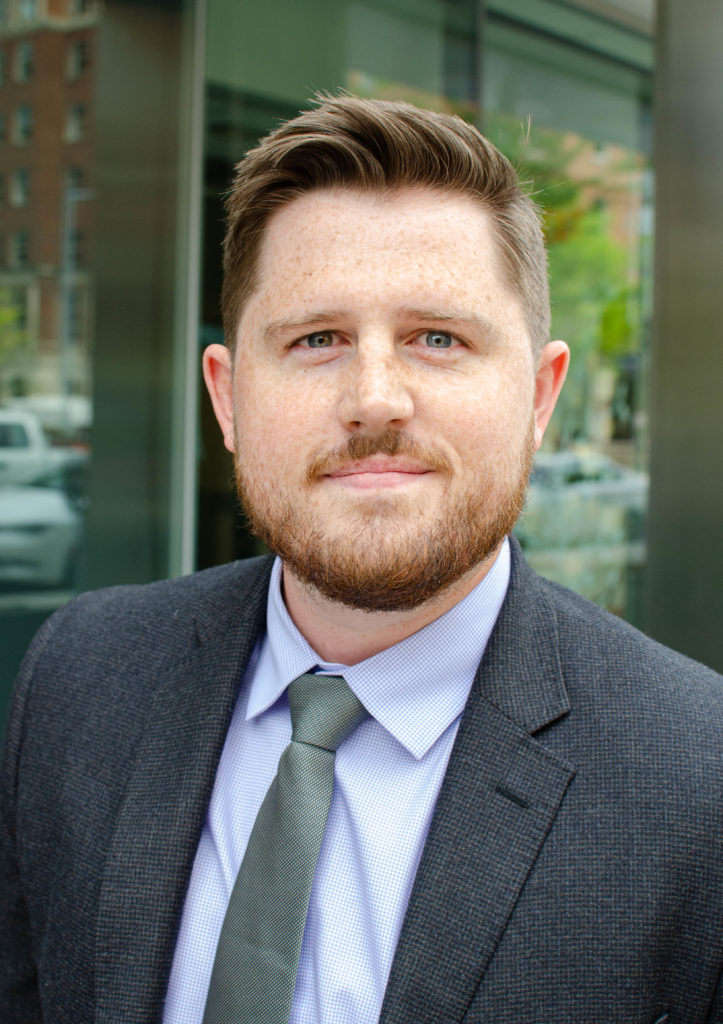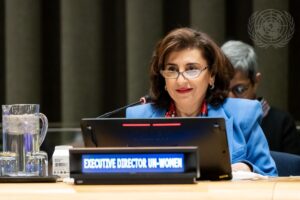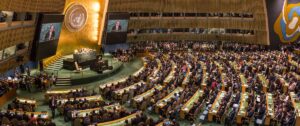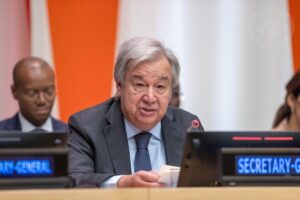
Alex Hopkins is a Research Associate with the Transforming Conflict and Governance Program at the Stimson Center. His research focuses on U.N peace operations, protection of civilians, legislative affairs, and the nexus of conflict and climate change. As part of Stimson’s Powering Peace project, he focuses on mapping the UN’s use of energy in the field to better understand the potential effects of a shift to renewable energy.
Why do you work at Stimson?
I was initially attracted to Stimson because of its mission, and its multidisciplinary approach. I also like that the organization doesn’t focus on a single problem. Stimson is like an Avengers team of brilliant people working on important issues collaboratively and in-depth.
I started at Stimson as an intern, so during my time here I have seen the organization from a variety of perspectives. And it’s clear to me that the people at Stimson are doing this work because they really believe in it and it motivates them intrinsically. People here don’t admire problems, rather they actually dig in and look for ways to change the status quo.
What is something you are most proud of this year?
To fully answer this question, it’s important to note that I work across four projects at Stimson: Powering Peace, which explores how UN peace operations can use renewable energy to mitigate climate change, enhance their mandate delivery, and reach the UN’s climate goals; Security for a New Century (SNC), which increases Congressional engagement and leadership on foreign affairs and defense issues; Strengthening NATO’s Ability to Protect, which brings NATO stakeholders and experts together to protect civilians; and the Atrocity Prevention Study Group (APSG), which brings policymakers and practitioners together to share knowledge and resources and build the capacity to prevent atrocities. Working across these projects is great and truly speaks to Stimson’s commitment – as well as my own commitment – to collaborate across issue areas.
I am so proud of the work we have done in response to Covid-19. One thing that Stimson prides itself on is deep engagement with stakeholders. Maintaining that engagement can be difficult in a remote environment, and we’ve done a really good job of it across all four projects. For example, this year Powering Peace conducted research for a case study on the UN peacekeeping mission in Mali. The work going on there is currently a hot topic, so there are a lot of interested parties – from US lawmakers to French Lawmakers to counter terrorism specialists, and of course the UN itself. We’ve managed to continue our case study – which previously would have been done in-country – over Zoom and other platforms, and we have successfully leveraged the time and flexibility that remote work provides. We’ve been able to have longer meetings and create new processes that accommodate stakeholders’ needs. This has enabled them to contribute to our work in ways they may not have been able to before.
What is something you haven’t been able to do that you want to do next?
I would love to grow the Powering Peace project and work on it full time. There is so much work to be done at the intersection of climate change, peace and security, and multilateralism, and Stimson has an important perspective to share. Practically speaking, growing this project would mean three things – building a larger, more diverse community in this space; facilitating stakeholder collaboration – from governments to renewable energy companies to NGOs – which has never been done before; and launching new pilot projects in countries where the UN is deployed to truly track the impact renewable energy use has.
What is something you wish people understood about your work?
The work I do across all of my projects really boils down to this – the United States needs to care about the world; it cannot be only inward-facing. We can’t turn a blind eye to the world around us. That means supporting institutions like the United Nations and caring about atrocities happening on the other side of the world. The United States has always claimed to care about those things, but we haven’t always walked the walk. People need to understand that an atrocity taking place overseas can and often will impact our lives and security in some form. And I wish more people understood that this is a key driver of the work I do.
The problems we face are so large that the United States – or any other country – cannot fix them alone. These problems don’t care about borders. Climate change does not care about who our allies are. It does not care about our trade agreements or our sanctions. We don’t live in a vacuum, and these issues – and our livelihoods – are interconnected. Ignoring them will lead to failure, because it means we won’t get ahead of a problem before it becomes unmanageable.
Follow Alex on Twitter @a_hopkins7 and learn more about the Transforming Conflict and Governance program.




